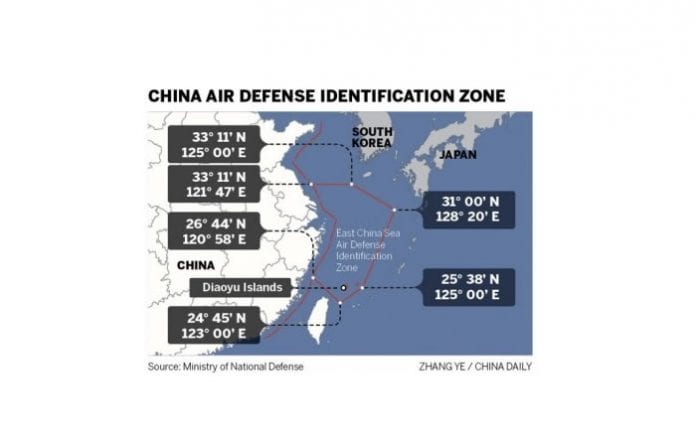China sent fighter jets to patrol its newly established Air Defense Identification Zone (ADIZ) in the East China Sea, according to report from state media, Xinhua.
Colonel Shen Jinke, spokesperson of China’s Air Force was quoted by Xinhua stating that some fighter jets and an early warning plane were deployed to conduct routine patrols in the zone as “defensive measure and in line with international common practices. Jinke added that the government’s air force stays on high alert to take necessary steps to protect China’s national security against all aerial threats.
Identification Requirements
The Chinese government requires all aircrafts flying over the area should submit flight plans and comply with identification requirements such maintaining a two-way radio communications and working secondary transponder. Aircrafts should also have visible logo of their registration identification and nationalities.
China said it would take “defensive emergency measures” against all aircrafts passing through the ADIZ without notification or flight plans. The United States, Japan, and South Korea condemned China. According to the United States government, China’s action is a “destabilizing attempt to alter the status quo in the region.”
The newly declared ADIZ covers the disputed Senkaku/Diaoyu islands, which are under the control of Japan. Aside from China, South Korea and Taiwan are also claiming some parts of the disputed group of islands.
Defying China’s ADIZ
The United States showed its defiance to China’s newly declared air defense identification rules in the disputed islands by sending a pair of B-52 bombers without notifying the Chinese government about the flight. Col. Steve Warren said the flight was part of the normal operations of U.S. Air Force in the region, which include “not filing flight plans, not radioing ahead, and not registering frequencies.”
Japan and South Korea also ignored the ADIZ and flew aircrafts over the region without informing China about their flight plans. Both countries vowed to maintain their normal operations in the region.
Japan’s Chief Cabinet Secretary, Yoshihide Suga said, “We have been operating normal warning and patrol activities in the East China Sea including that area. We have no intention of changing this.” On the other hand, South Korea’s Vice Defense Minister Baek Seung-joo said his country will not recognize the China’s ADIZ and demanded modification.
China monitored U.S. B-52 bombers
China’s Defense Ministry said its air force monitored the entire flight of the two B-52 bombers deployed by the United States government. The Ministry said, “China will identify all aircraft activity in East China Sea Air Defense Identification Zone. China has the ability to effectively manage and control the relevant air zone.”









